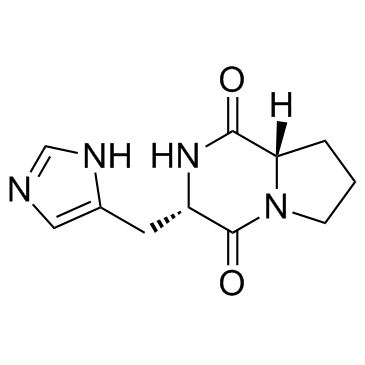Cyclo(his-pro) (Cyclo(histidyl-proline)) (Synonyms: Cyclo(His-Pro), Cyclo(histidyl-proline), Histidylproline diketopiperazine, Histidylproline dioxopiperazine) |
| Catalog No.GC30806 |
Cyclo(his-pro) (Cyclo(histidyl-proline)) (Cyclo(histidyl-proline)) is an orally active cyclic dipeptide structurally related to tyreotropin-releasing hormone.
Products are for research use only. Not for human use. We do not sell to patients.

Cas No.: 53109-32-3
Sample solution is provided at 25 µL, 10mM.
Cyclo(His-Pro) is a cyclic dipeptide structurally related to tyreotropin-releasing hormone. Cyclo(His-Pro) could inhibit NF-κB nuclear accumulation.
Cyclo(His-Pro) is a cyclic dipeptide derived from the hydrolytic removal of the amino-terminal pyroglutamic acid residue of the hypothalamic thyrotropin-releasing hormone. Cyclo(His-Pro) is ubiquitous in the central nervous system and is a key substrate of organic cation transporters, which are strongly linked to neuroprotection. The cyclic dipeptide can also cross the brain-blood-barrier and, once in the brain, can affect diverse inflammatory and stress responses by modifying the Nrf2-NF-κB signaling axis[1]. Cyclo(His-Pro) inhibits NF-κB nuclear accumulation induced by paraquat in rat pheochromocytoma PC12 cells via the Nrf2/heme oxygenase-1 pathway[2].
Mice that receives cyclo(His-Pro) pre-treatment shows a significant decrease in the oedematogenic response, confirming that the cyclic dipeptide can exert anti-inflammatory effect[2]. Cyclo(His-Pro) exerts in vivo anti-inflammatory effects in the central nervous system by down-regulating hepatic and cerebral TNFα expression thereby counteracting LPS-induced gliosis. Moreover, by up-regulating Bip, cyclo(His-Pro) increases the ER stress sensitivity andtriggers the unfolded protein response to alleviate the ER stress[3].
[1]. Grottelli S, et al. The Role of Cyclo(His-Pro) in Neurodegeneration. Int J Mol Sci. 2016 Aug 12;17(8). pii: E1332. [2]. Minelli A, et al. Cyclo(His-Pro) exerts anti-inflammatory effects by modulating NF-κB and Nrf2 signalling. Int J Biochem Cell Biol. 2012 Mar;44(3):525-35. [3]. Bellezza I, et al. Neuroinflammation and endoplasmic reticulum stress are coregulated by cyclo(His-Pro) to prevent LPS neurotoxicity. Int J Biochem Cell Biol. 2014 Jun;51:159-69.
Average Rating: 5 (Based on Reviews and 9 reference(s) in Google Scholar.)
GLPBIO products are for RESEARCH USE ONLY. Please make sure your review or question is research based.
Required fields are marked with *




















